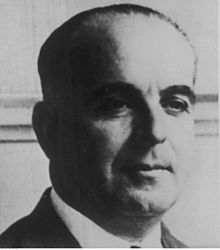José Enrique Varela
| José Enrique Varela | |
|---|---|
 |
|
| Birth name | José Enrique Varela |
| Born |
April 17, 1891 San Fernando, Cádiz, Spain |
| Died | March 24, 1951 (aged 59) Tánger, Morocco |
| Allegiance |
|
| Service/branch | Army |
| Years of service | 1904-1951 |
| Rank | General |
| Battles/wars |
Rif War Spanish Civil War |
| Awards | Laureate Cross of Saint Ferdinand |
José Enrique Varela Iglesias, 1st Marquis of San Fernando de Varela (April 17, 1891 in San Fernando, Cadiz, Spain – March 24, 1951 in Tangier) was a Spanish military officer noted for his role as a Nationalist commander in the Spanish Civil War.
Varela started his military career as an enlisted man and fought in the colonial wars in the Rif for three years starting in 1909. He rose to the rank of sergeant and then enrolled at infantry school in Spain and graduated as a lieutenant.
Returning to Morocco, he distinguished himself in action and King Alfonso XIII awarded him the Laureate Cross of Saint Ferdinand, Spain's highest military award, on two separate occasions, an unmatched honor for bravery in battle. He mostly commanded native Moroccan troops of Regulares and rose to the rank of captain by merit and participated in several campaigns in the Morocco war, the principal one being the joint Franco-Spanish amphibious landing at Alhucemas in 1925. This landing altered the course of the Morocco War and hastened its end. Shortly thereafter he was promoted to lieutenant colonel and to colonel at the end of the war.
During the early 1930s, he was assigned as a member of a military mission that spent time in Germany, Switzerland, Belgium and France to broaden their military knowledge. With the coming of the Republic, he participated in the abortive José Sanjurjo uprising in 1932 for which he was imprisoned. He was released and joined the Carlists and organized the militia or the paramilitary units of the Carlists, the Requetés, into the formidable military organization that it became in the Spanish Civil War. Disguised as a priest, Uncle Pepe, he traveled along the Pyrenean villages organizing the people and readying them for war. He actively participated in the planning for the rising that started the Spanish Civil War. In April, 1936, the government found out about his plotting and imprisoned him.
...
Wikipedia
